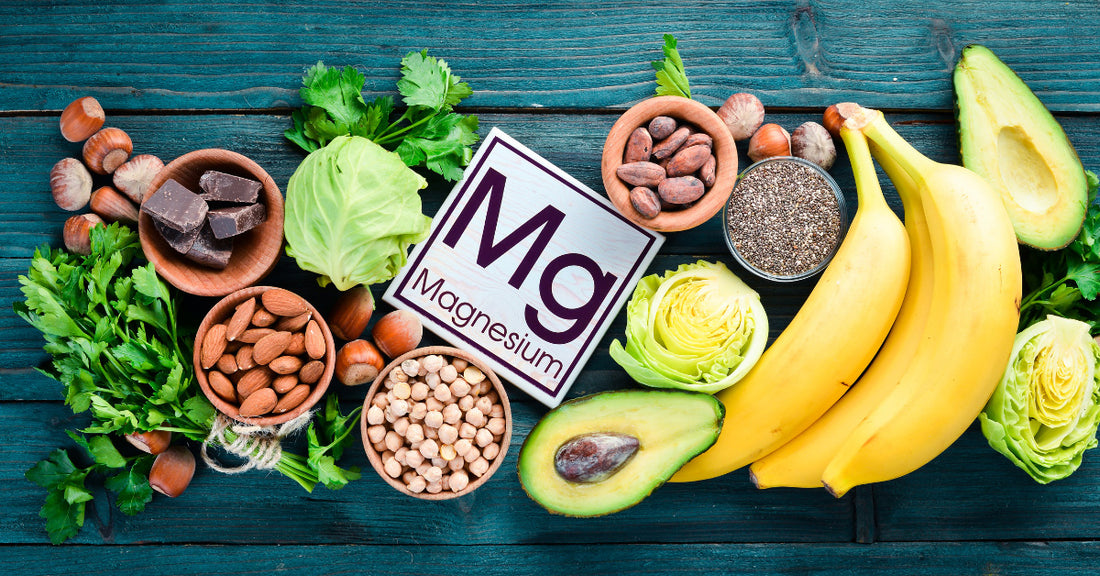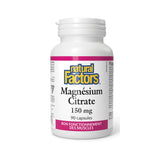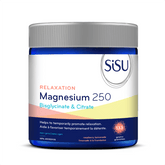Magnesium is a vital mineral involved in many processes essential to the proper functioning of the human body. It plays a key role in regulating muscular, nervous, immune and cardiac functions, as well as in the synthesis of proteins.èprotein and bone synthesis and much more. Despite its crucial importance, many people in the Western world are magnesium deficient. In this article, you'll learn why magnesium is so important, which foods contain it, and why it's so common. Finally, it offers an overview of the different types of supplements available on the market and the differences between types of magnesium, so you can find the one that's right for you.
The 7 benefits of magnesium
Magnesium is a cofactor required for over 300 enzymatic reactions in the body, making it an essential nutrient for almost all major bodily functions.1, 2, 3, 4, 6 Among the main body functions concerned are :
1. Cardiac and muscular support
Magnesium helps keep muscles working properly. As calcium is mainly involved in muscle contraction, magnesium acts as its antagonist, encouraging muscle relaxation.1, 2, 3, 5
Magnesium deficiency can lead to cramps, muscle spasms or simple tensions or contractures that persist over time.1, 2, 3, 5
As the heart is also a smooth muscle with a good affinity for magnesium, the latter helps to maintain a regular heartbeat.3 It also helps prevent cardiovascular disorders such as arrhythmias, high blood pressure and strokes.1, 3 As one of the 4 electrolytes2, 6 electrolytes, it helps regulatebalance balance in heart muscle cells and prevent excessive or irregular contractions.ècontractions.5
2. Regulates nerve impulses, reduces stress and irritability and improves sleep.
Many people will be pleased to know that a simple lack of magnesium can be the cause of nervous disorders such as anxiety, irritability, bad moods, insomnia, chronic stress and so on.5 In fact, the presence of magnesium in nervous metabolites enables our bodies to return to a state of relaxation and even to find, deepen and maintain sleep.1, 3
This is attributed, among other things, to its role in the production of GABA, a calming neurotransmitter.1, 5
Magnesium is also essential for the transmission of nerve signals, regulating communication between the brain and muscles.1, 2, 5, 6 A lack of magnesium will often result in nervous hyperexcitability.1
3. Bone health
Along with calcium and vitamin D, magnesiumsium helps in the formation and maintenance of’systemèsystem.1, 2 Combined with regular exercise and adequate protein intake, it helps prevent osteopenia and boneosteoporosis. In fact, magnesium is contained in bone and contributes to the proper binding of calcium in the right place.1, 2, 3, 5
A dequilibrium between calcium and magnesium can weaken bone structure.1, 3, 5
4. Promotes energy production, reduces fatigue and prevents overweight
It's a well-known fact that food provides us with the fuel we need to produce energy. That is, what we eat is, or will be, converted into glucose to enter the mitochondria (the cell's energy powerhouse) to produce ATP, which is THE substrate used for any type of energy. Here, we need several molecules of magnesium to obtain 1 molecule of ATP.1, 2, 5, 6
I often like to make the comparison with a house. If we use a lot of wood and a lot of workers to build our house, that's fine. But if we don't have tools or nails, screws, glue and scaffolding, it will be much harder for our workers to make good use of the building materials. We need to understand that glucose (food) is the wood, workers are the mitochondria and magnesium are the tools to get to the final substance.
Since magnesium is often known to help sleep, people often express fear of taking it in the morning. On the contrary, taking it in the morning and evening is excellent.
Obviously, it's by producing energy with our food that it won't be transformed into fat! And magnesium contributes to maintaining a healthy weight through its action on leptin (the hunger hormone) and insulin, as well as on inflammation, all of which are closely or distantly linked with overweight.1, 2, 3
5. Enhanced sporting performance
Since magnesium goes hand in hand with energy production and muscle function, it's logical to understand that athletes need magnesium to improve their performance.èathletes or active people can benefit from magnesium supplementation to improve their physical performance and general well-being, since it increases their energy intake.2, 3, 5
6. Maintaining blood sugar levels and preventing diabetes
Magnesium plays an important role in the regulation of blood sugar levels and the sensitivity of the body to diabetes. insulin sensitivity. In fact, people who consume enough magnesium are less likely to develop diabetes.ètype 2 diabetes.1, 5 This mineral helps cells to use insulin correctly, reducing blood sugar peaks.1, 2, 5
7. Reduces PMS (premenstrual syndrome), menstrual pain, menopausal symptoms, migraines, inflammation, oxidative stress and more.
Here againhe magnésium plays a key role in many bodily functions and provides a number of benefits. It helps reduce PMS and menopausal symptoms by promoting healthy hormone management, regulating neurotransmitters and reducing cramps and water retention.2, 3, 5
For migraines, magnesium helps relax blood vessels and regulate neurotransmitters, reducing the frequency and intensity of attacks.2, 5
It also has an anti-inflammatory effect, reducing inflammation markers such as C-reactive protein (CRP), balancing calcium and protecting against oxidative stress.1, 3
In short, we need it, everywhere, all the time, for everything! And when we lack it, our body speaks to us with a variety of ailments!
Foods rich in magnesium

To maintain a good level of magnlevels, it is important to regularly consumeèfoods rich in this mineral. Here are some of the best foods to include in your diet:
- Seeds and nuts Almonds, cashews, Brazil nuts, pumpkin seeds and chia seeds are all excellent sources of magnesium and other minerals such as selenium.1, 3
- Green vegetables Spinach, kale, green peas and chard are rich in magnesium and contain other essential nutrients such as iron.1, 3
- Pulses Black beans, lentils and chickpeas are excellent vegetable sources of magnesium and protein.ines.1, 3
- Complementary cerealsètes Quinoa, oats, brown rice and whole wheat also contain significant amounts of magnesium.1, 3
- Avocados An average avocado contains around 15% of the recommended daily intake. of magnesiumésium.1, 3
- Dark chocolate My favorite ;) High-quality dark chocolate (at least 70% cocoa) is an excellent source of magnesium.1 It contains up to 110 mg of magnésium per 100 gram serving.3
Note that organic, local and fresh foods are more likely to contain more interesting sources of magnesium.3
Why are so many people magnesium deficient?
Despite the abundance of magnesium-rich foods, magnesium deficiency is common in modern society. In fact, depending on the sources, studies and authors consulted, between 30% and 75% of people suffer from magnesium deficiency.3, 5, 6
Several factors may explain this situation:
Soil impoverishment
One of the main factors behind magnesium deficiency is the depletion of agricultural soils. Intensive farming methods and the massive use of chemical fertilizers deplete soils of minerals, including magnesium. In other words, the same vegetable grown today is poorer in minerals than it was in the past.1, 2, 3, 6
Processed food
The modern diet is all too often rich in processed foods, which are devoid of many essential nutrients, including magnesium. Processed foods, such as white flour products, refined sugars and industrial dishes, lose most of their original nutrients during processing.1, 2, 3, 5, 6
Alcohol, coffee and tea also promote more significant magnesium excretion.3
Excessive calcium consumption
As calcium and magnesium are antagonists, they must be consumed in a balanced ratio.balance relative to the body's needs. However, in many countries, the emphasis is on high calcium consumption for good health. bone health. An excèof calcium without sufficient magnesium can cause imbalances and lead to poor absorption and utilization of the latter.
Chronic stress
Stress is a major cause of magnesium deficiency. When the body is under constant strain, it rapidly uses up its magnesium reserves to counteract the negative effects of stress on muscles and the nervous system.ènervous system.1, 2
Stress also increases urinary magnesium excretion.1, 2
In addition, stress can lead to dietary behaviors that further exacerbate deficiency, such as excessive consumption of coffee, alcohol or processed foods, all of which are known to reduce magnesium levels.
Digestive disorders and medication
We're talking here about certain medical conditions such as digestive diseases (Crohn's disease, celiac disease, etc.), people who have undergone intestinal surgery, or even simple intestinal dysbiosis (an imbalance of bacteria that can alter the absorption of all minerals in the gut).3, 5
What's more, certain drugs such as diuretics, proton pump inhibitors (used to treat heartburn and reflux) and the contraceptive pill, to name but a few, will either reduce magnesium absorption or increase urinary excretion.1, 2, 3, 5 ,6
The different types of magnesium supplements
If you've taken the time to read the whole article, you'll have understood that very few people don't need a magnesium supplement at all, unless you live recluse from society, on an island of fertile land untouched by pollution, far from modern stress and technology!
Indeed, along with vitamin D, it's the supplement I most often suggest for conditions ranging from mood disorders to hypertension, migraines to autism, and menopause.
However, there are several types of magnesium supplements, each with specific characteristics and different levels of absorption; depending on your needs and condition, some may be more appropriate than others.
All types of magnesium contain elemental magnesium, the big difference being the molecule to which they are attached.
Magnésium citrate
Magnesium citrate is one of the most commonly used supplements, as it is well absorbed by the body, and is particularly affordable. It is often suggested to relieve constipation, as it acts as a mild laxative by bringing more water into the intestine. It's an excellent choice for people who need magnesium, and who tend to experience constipation.2, 5
- Magnesium Citrate capsules from Natural Factors
- Magnesium Citrate chewable tablets by Natural Factors
Magnesium glycinate
Magnesium glycinate is a highly absorbable form, gentle on the stomach and intestines. Unlike citrateit is unlikely to cause laxative effects.2, 3, 5
It is the type of magnesium I most often suggest (and take myself).
In fact, this form is ideal for increasing magnesium levels without influencing digestion.3
What's more, the related molecule, glycine, is a calming amino acid, as it contributes to the production of GABA, the famous calming neurotransmitter. So it's even more relaxing!
- Magnesium Glycinate capsules from Pure Lab Vitamins
- Magnesium Glycinate Powder by Pure Lab Vitamins
Magnesium oxide
Magnesium oxide is commonly used in supplements due to its high concentration of elemental magnesium, and its low cost. However, its absorption is relatively low compared to other forms. It is mainly used for people who tend to experience constipation, but it modifies magnesium levels in the whole body much less rapidly..2, 3
- Magnesium oxide from Natural Factors
Magnesium malate
Magnesium malate is another well-absorbed form often recommended for boosting energy levels, as malate is an essential component of the cellular energy cycle. It's an excellent choice for fatigued individuals, athletes and people struggling with fibromyalgia..2
- Mag Malate Renew from AOR
Magnesium orotate
Magnesium orotate is often used for its potential benefits for heart health. The orotic acid to which magnesium is bound in this compound plays a role in energy production at the cellular level. Magnesium orotate is also well absorbed by the body, making it a good choice for those in need of extra magnesium..2
Magnesium l-threonate
Magnesium l-threonate is a relatively new form that is attracting a great deal of interest for its potential effects on brain health. It is able to penetrate more effectively the barrièbarrier (the protective membrane around the brain) more efficiently.5which makes it a good choice for everything to do with the brain: cognition, memory, anxiety.2
- Magnesium L-Threonate liposomal by Naka Platinum
Its higher cost suggests that it should be reserved for more extreme cases, and it could easily be combined with glycinate.
|
Type of magnesium |
Absorption level |
Main uses |
|
Magnesium citrate |
High |
Mild laxative, digestion, muscle cramp relief, constipation |
|
Magnesium glycinate |
Very high |
Anxiety, stress, sleep disorders, fatigue, muscle relaxant |
|
Magnesium malate |
Medium to high |
Chronic fatigue, muscle pain, fibromyalgia, energy |
|
Magnesium oxide |
Low |
Constipation (laxative effect), little used for general supplementation |
|
Magnesium orotate |
Medium |
Cardiovascular health, athletic performance, cellular support |
|
Magnesium L-theonate |
High (brain level) |
Memory, cognition, brain support, neurological health |
Other relevant natural supplements
Some formulas also contain calcium and vitamin D for bones.
- Cal Mag Supreme tablets from Health first
- Cal Mag Supreme liquid from Health First
- Cal Mag + K2 Supreme by Health First
Here, the Sisu company has included theanine and GABA to help you relax and fall asleep.
I really like Genestra's Magnesium Complex formula, which combines citrate, malate and glycinate. In my experience, by gradually increasing the dosage each day, it can also work wonders on constipation.
- Liquid Magnesium Complex from Genestra
In conclusion: let's talk about dosages!
It's always difficult to give dosages in an article, since dosage can vary enormously from one person to another, depending on need and the form of magnesium used.
But to give you an idea, you'd need around 6 mg of magnesium per kg of weight, per day.1, 3, 5
Dosages vary according to age, level of stress and physical activity, medication taken, etc.5
Depending on the author and source, you may need as much as 10 mg per kg of body weight.2, 5
This 6 mg per kg of weight per day includes, of course, dietary sources, which can vary greatly between two people of the same weight and age, and are not always easy to assess.
To give you a brief idea, therapeutic dosages can range from 250 to 1000 mg per day, taken in several doses, from 130 to 200 mg per dose.2, 3, 5
The most standard dosage is between 130 and 200 mg, taken 2 times a day, including one in the evening to facilitate, or simply deepen, sleep.
It can be taken in liquid or capsule form, depending on personal preference. As you will have gathered, it's the molecular form that's important, not the solid or liquid formula.
Overdoses are particularly rare, especially in healthy people, simply because the body easily eliminates surpluses through the kidneys.2, 3, 6 Depending on the form used, it can cause diarrhoea, which is not ideal, hence the importance of choosing a form that suits you.3
More serious effects, such as heart trouble or coma, have been reported following dosages higher than 8000mg per day in people with kidney failure.1, 3, 6 If you have a kidney problem, it's important to speak to your doctor before taking a magnesium supplement.2
There's a lot more to be said about this precious mineral. But the most important thing is to find the form and dosage that's right for you, with a supplement that's easy to integrate into your routine.
The advisors at La Boite à Grains advisors are here to help you with your choice and answer any questions you may have.
For more complex issues, it may be appropriate to see a certified naturopath in private consultation.
About the author
Marie-France Trudelle, Certified Naturopath
In-depth knowledge of :
- Nutrition and dietary supplements
- Stress management and sleep
- Physical activity and movement
- Massage therapy
References
- Dr Anne-Laure Denans, Treat yourself with magnesiumÉditions Thierry Souccar, 2018, 191 pages.
- Andréanne Hatin ND.A & Solange Alary ND.A,. Nutrithérapie orthomolecularIESN, Magnesium Section, 2023
- Estelle Lefevre, Discover the virtues of MagnesiumÉditions Alpen, 2018, 129 pages
- Lecture, Sophie Roland, neuro-scientist in Neuronutrition: what to eat for a healthy brainheld on June 11, 2024 as part of the congressècongress on metabolic health.
- Guénette, Lise, MineralogramIESN, 2016
- Lise Guénette, Webinar: All you need to know about magnesiumNatural Factors, May 2023
- Marie B Elaine N. and Hoehn Katja, Human anatomy and physiology, Fourthème édition, éditions du Renouveau Pédagogique, p. 209-1064-1165.


















